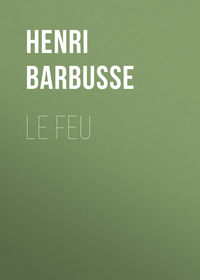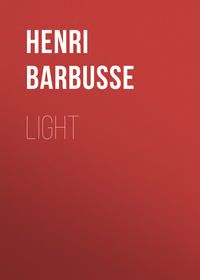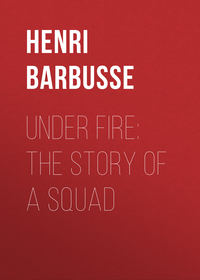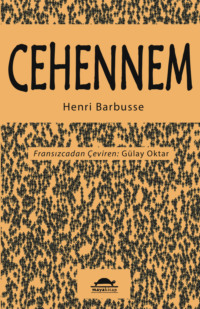
Полная версия
Under Fire: the story of a squad


Titel: Under Fire: the story of a squad
von Oliver Goldsmith, Samuel Pepys, William Dean Howells, John Burroughs, William Harmon Norton, L. Mühlbach, Franklin Knight Lane, Walter Pater, Jonathan Swift, Augusta J. Evans, Trumbull White, Kathleen Thompson Norris, Matthew Arnold, Charles W. Colby, Shakespeare, James Fenimore Cooper, D. H. Lawrence, James Joyce, Ada Cambridge, Philip E. Muskett, Catherine Helen Spence, Rolf Boldrewood, Ernest Scott, Fergus Hume, H. G. Wells, Victor [pseud.] Appleton, Roald Amundsen, Max Simon Nordau, Henry David Thoreau, E. Phillips Oppenheim, Richard Wagner, Franz Liszt, Charlotte Mary Yonge, Charles Henry Eden, Charles Babbage, T. R. Malthus, Unknown, Joseph Ernest Morris, Robert Southey, Isabella L. Bird, Charles James Fox, Thomas Hariot, Cyrus Thomas, Bart Haley, Christopher Morley, Edgar Saltus, Marie Corelli, Edmund Lester Pearson, Robert Browning, John Aubrey, Benjamin Nathaniel Bogue, John McElroy, John Galsworthy, Henry James, Hamilton Wright Mabie, Mina Benson Hubbard, Elizabeth Cleghorn Gaskell, John Keble, Henry Lindlahr, Richard Henry Dana, Annie Wood Besant, Immanuel Kant, John Habberton, Baron Edward John Moreton Drax Plunkett Dunsany, T. B. Ray, Isabel Ecclestone Mackay, Frank C. Haddock, William John Locke, baron Arthur Léon Imbert de Saint-Amand, Ralph Centennius, United States, Library of Congress. Copyright Office, James Otis, George Hartmann, Sir Arthur Conan Doyle, George Gissing, John Henry Tilden, Thomas Wright, Frederick Samuel Dellenbaugh, Anonymous, J. Clontz, David Hume, Margot Asquith, Elmer Ulysses Hoenshel, Byron J. Rees, Lida B. McMurry, Georges Duhamel, Ramsay Muir, Edith Wharton, Charles Sturt, Lola Ridge, J. M. Stone, Annie Payson Call, Grant Allen, kniaz Petr Alekseevich Kropotkin, Steve Solomon, Isabel Moser, Aleksandr Sergeevich Pushkin, Horace W. C. Newte, Charles Darwin, Maurice Maeterlinck, Walter Bagehot, Henri Bergson, George Randolph Chester, John S. C. Abbott, L. Frank Baum, William T. Sherman, Philip Henry Sheridan, Friedrich Wilhelm Nietzsche, Ambrose Bierce, Ulysses S. Grant, F. Scott Fitzgerald, Alfred Lichtenstein, Abbot of Nogent-sous-Coucy Guibert, Nellie L. McClung, Alice Caldwell Hegan Rice, E. Nesbit, Henri Barbusse
ISBN 978-3-7429-4238-8
Alle Rechte vorbehalten.
Es ist ohne vorherige schriftliche Erlaubnis nicht gestattet, dieses Werk im Ganzen oder in Teilen zu vervielfältigen oder zu veröffentlichen.
Under Fire
The Story of a Squad
By
Henri Barbusse
(1874-1935)
Translated by Fitzwater Wray
To
the memory of
the comrades who fell by my side
at Crouy and on Hill 119
January, May, and September 1915
Contents
I. The Vision II. In the Earth III. The Return IV. Volpatte and Fouillade V. Sanctuary VI. Habits VII. Entraining VIII. On Leave IX. The Anger of Volpatte X. Argoval XI. The Dog XII. The Doorway XIII. The Big Words XIV. Of Burdens XV. The Egg XVI. An Idyll XVII. The Sap XVIII. A Box of Matches XIX. Bombardment XX. Under Fire XXI. The Refuge XXII. Going About XXIII. The Fatigue-Party XXIV. The Dawn
UNDER FIRE
I
The Vision
MONT BLANC, the Dent du Midi, and the Aiguille Verte look across at the bloodless faces that show above the blankets along the gallery of the sanatorium. This roofed-in gallery of rustic wood-work on the first floor of the palatial hospital is isolated in Space and overlooks the world. The blankets of fine wool—red, green, brown, or white—from which those wasted cheeks and shining eyes protrude are quite still. No sound comes from the long couches except when some one coughs, or that of the pages of a book turned over at long and regular intervals, or the undertone of question and quiet answer between neighbors, or now and again the crescendo disturbance of a daring crow, escaped to the balcony from those flocks that seem threaded across the immense transparency like chaplets of black pearls.
Silence is obligatory. Besides, the rich and high-placed who have come here from all the ends of the earth, smitten by the same evil, have lost the habit of talking. They have withdrawn into themselves, to think of their life and of their death.
A servant appears in the balcony, dressed in white and walking softly. She brings newspapers and hands them about.
"It's decided," says the first to unfold his paper. "War is declared."
Expected as the news is, its effect is almost dazing, for this audience feels that its portent is without measure or limit. These men of culture and intelligence, detached from the affairs of the world and almost from the world itself, whose faculties are deepened by suffering and meditation, as far remote from their fellow men as if they were already of the Future—these men look deeply into the distance, towards the unknowable land of the living and the insane.
"Austria's act is a crime," says the Austrian.
"France must win," says the Englishman.
"I hope Germany will be beaten," says the German.
They settle down again under the blankets and on the pillows, looking to heaven and the high peaks. But in spite of that vast purity, the silence is filled with the dire disclosure of a moment before.
War!
Some of the invalids break the silence, and say the word again under their breath, reflecting that this is the greatest happening of the age, and perhaps of all ages. Even on the lucid landscape at which they gaze the news casts something like a vague and somber mirage.
The tranquil expanses of the valley, adorned with soft and smooth pastures and hamlets rosy as the rose, with the sable shadow-stains of the majestic mountains and the black lace and white of pines and eternal snow, become alive with the movements of men, whose multitudes swarm in distinct masses. Attacks develop, wave by wave, across the fields and then stand still. Houses are eviscerated like human beings and towns like houses. Villages appear in crumpled whiteness as though fallen from heaven to earth. The very shape of the plain is changed by the frightful heaps of wounded and slain.
Each country whose frontiers are consumed by carnage is seen tearing from its heart ever more warriors of full blood and force. One's eyes follow the flow of these living tributaries to the River of Death. To north and south and west ajar there are battles on every side. Turn where you will, there is war in every corner of that vastness.
One of the pale-faced clairvoyants lifts himself on his elbow, reckons and numbers the fighters present and to come—thirty millions of soldiers. Another stammers, his eyes full of slaughter, "Two armies at death-grips—that is one great army committing suicide."
"It should not have been," says the deep and hollow voice of the first in the line. But another says, "It is the French Revolution beginning again." "Let thrones beware!" says another's undertone.
The third adds, "Perhaps it is the last war of all." A silence follows, then some heads are shaken in dissent whose faces have been blanched anew by the stale tragedy of sleepless night—"Stop war? Stop war? Impossible! There is no cure for the world's disease."
Some one coughs, and then the Vision is swallowed up in the huge sunlit peace of the lush meadows. In the rich colors of the glowing kine, the black forests, the green fields and the blue distance, dies the reflection of the fire where the old world burns and breaks. Infinite silence engulfs the uproar of hate and pain from the dark swarmings of mankind. They who have spoken retire one by one within themselves, absorbed once more in their own mysterious malady.
But when evening is ready to descend within the valley, a storm breaks over the mass of Mont Blanc. One may not go forth in such peril, for the last waves of the storm-wind roll even to the great veranda, to that harbor where they have taken refuge; and these victims of a great internal wound encompass with their gaze the elemental convulsion.
They watch how the explosions of thunder on the mountain upheave the level clouds like a stormy sea, how each one hurls a shaft of fire and a column of cloud together into the twilight; and they turn their wan and sunken faces to follow the flight of the eagles that wheel in the sky and look from their supreme height down through the wreathing mists, down to earth.
"Put an end to war?" say the watchers.—"Forbid the Storm!"
Cleansed from the passions of party and faction, liberated from prejudice and infatuation and the tyranny of tradition, these watchers on the threshold of another world are vaguely conscious of the simplicity of the present and the yawning possibilities of the future.
The man at the end of the rank cries, "I can see crawling things down there"—"Yes, as though they were alive"—"Some sort of plant, perhaps"—"Some kind of men"—
And there amid the baleful glimmers of the storm, below the dark disorder of the clouds that extend and unfurl over the earth like evil spirits, they seem to see a great livid plain unrolled, which to their seeing is made of mud and water, while figures appear and fast fix themselves to the surface of it, all blinded and borne down with filth, like the dreadful castaways of shipwreck. And it seems to them that these are soldiers.
The streaming plain, seamed and seared with long parallel canals and scooped into water-holes, is an immensity, and these castaways who strive to exhume themselves from it are legion. But the thirty million slaves, hurled upon one another in the mud of war by guilt and error, uplift their human faces and reveal at last a bourgeoning Will. The future is in the hands of these slaves, and it is clearly certain that the alliance to be cemented some day by those whose number and whose misery alike are infinite will transform the old world.
II
In the Earth
THE great pale sky is alive with thunderclaps. Each detonation reveals together a shaft of red falling fire in what is left of the night, and a column of smoke in what has dawned of the day. Up there—so high and so far that they are heard unseen—a flight of dreadful birds goes circling up with strong and palpitating cries to look down upon the earth.
The earth! It is a vast and water-logged desert that begins to take shape under the long-drawn desolation of daybreak. There are pools and gullies where the bitter breath of earliest morning nips the water and sets it a-shiver; tracks traced by the troops and the convoys of the night in these barren fields, the lines of ruts that glisten in the weak light like steel rails, mud-masses with broken stakes protruding from them, ruined trestles, and bushes of wire in tangled coils. With its slime-beds and puddles, the plain might be an endless gray sheet that floats on the sea and has here and there gone under. Though no rain is falling, all is drenched, oozing, washed out and drowned, and even the wan light seems to flow.
Now you can make out a network of long ditches where the lave of the night still lingers. It is the trench. It is carpeted at bottom with a layer of slime that liberates the foot at each step with a sticky sound; and by each dug-out it smells of the night's excretions. The holes themselves, as you stoop to peer in, are foul of breath.
I see shadows coming from these sidelong pits and moving about, huge and misshapen lumps, bear-like, that flounder and growl. They are "us." We are muffled like Eskimos. Fleeces and blankets and sacking wrap us up, weigh us down, magnify us strangely. Some stretch themselves, yawning profoundly. Faces appear, ruddy or leaden, dirt-disfigured, pierced by the little lamps of dull and heavy-lidded eyes, matted with uncut beards and foul with forgotten hair.
Crack! Crack! Boom!—rifle fire and cannonade. Above us and all around, it crackles and rolls, in long gusts or separate explosions. The flaming and melancholy storm never, never ends. For more than fifteen months, for five hundred days in this part of the world where we are, the rifles and the big guns have gone on from morning to night and from night to morning. We are buried deep in an everlasting battlefield; but like the ticking of the clocks at home in the days gone by—in the now almost legendary Past—you only hear the noise when you listen.
A babyish face with puffy eyelids, and cheek-bones as lurid as if lozenge-shaped bits of crimson paper had been stuck on, comes out of the ground, opens one eye, then the other. It is Paradis. The skin of his fat cheeks is scored with the marks of the folds in the tent-cloth that has served him for night-cap. The glance of his little eye wanders all round me; he sees me, nods, and says—"Another night gone, old chap."
"Yes, sonny; how many more like it still?"
He raises his two plump arms skywards. He has managed to scrape out by the steps of the dug-out and is beside me. After stumbling over the dim obstacle of a man who sits in the shadows, fervently scratches himself and sighs hoarsely, Paradis makes off—lamely splashing like a penguin through the flooded picture.
One by one the men appear from the depths. In the corners, heavy shadows are seen forming—human clouds that move and break up. One by one they become recognizable. There is one who comes out hooded with his blanket—a savage, you would say, or rather, the tent of a savage, which walks and sways from side to side. Near by, and heavily framed in knitted wool, a square face is disclosed, yellow-brown as though iodized, and patterned with blackish patches, the nose broken, the eyes of Chinese restriction and red-circled, a little coarse and moist mustache like a greasing-brush.
"There's Volpatte. How goes it, Firmin?"
"It goes, it goes, and it comes," says Volpatte. His heavy and drawling voice is aggravated by hoarseness. He coughs—"My number's up, this time. Say, did you hear it last night, the attack? My boy, talk about a bombardment—something very choice in the way of mixtures!" He sniffles and passes his sleeve under his concave nose. His hand gropes within his greatcoat and his jacket till it finds the skin, and scratches. "I've killed thirty of them in the candle," he growls; "in the big dug-out by the tunnel, mon vieux, there are some like crumbs of metal bread. You can see them running about in the straw like I'm telling you."
"Who's been attacking? The Boches?"
"The Boches and us too—out Vimy way—a counterattack—didn't you hear it?"
"No," the big Lamuse, the ox-man, replies on my account; "I was snoring; but I was on fatigue all night the night before."
"I heard it," declares the little Breton, Biquet; "I slept badly, or rather, didn't sleep. I've got a doss-house all to myself. Look, see, there it is—the damned thing." He points to a trough on the ground level, where on a meager mattress of muck, there is just body-room for one. "Talk about home in a nutshell!" he declares, wagging the rough and rock-hard little head that looks as if it had never been finished. "I hardly snoozed. I'd just got off, but was woke up by the relief of the 129th that went by—not by the noise, but the smell. Ah, all those chaps with their feet on the level with my nose! It woke me up, it gave me nose-ache so."
I knew it. I have often been wakened in the trench myself by the trail of heavy smell in the wake of marching men.
"It was all right, at least, if it killed the vermin," said Tirette.
"On the contrary, it excites them," says Lamuse; "the worse you smell, the more you have of 'em."
"And it's lucky," Biquet went on, "that their stink woke me up. As I was telling that great tub just now, I got my peepers open just in time to seize the tent-cloth that shut my hole up—one of those muck-heaps was going to pinch it off me."
"Dirty devils, the 129th." The human form from which the words came could now be distinguished down below at our feet, where the morning had not yet reached it. Grasping his abundant clothing by handsful, he squatted and wriggled. It was Papa Blaire. His little eyes blinked among the dust that luxuriated on his face. Above the gap of his toothless mouth, his mustache made a heavy sallow lump. His hands were horribly black, the top of them shaggy with dirt, the palms plastered in gray relief. Himself, shriveled and dirtbedight, exhaled the scent of an ancient stewpan. Though busily scratching, he chatted with big Barque, who leaned towards him from a little way off.
"I wasn't as mucky as this when I was a civvy," he said.
"Well, my poor friend, it's a dirty change for the worse," said Barque.
"Lucky for you," says Tirette, going one better; "when it comes to kids, you'll present madame with some little niggers!"
Blaire took offense, and gathering gloom wrinkled his brow. "What have you got to give me lip about, you? What next? It's war-time. As for you, bean-face, you think perhaps the war hasn't changed your phizog and your manners? Look at yourself, monkey-snout, buttock-skin! A man must be a beast to talk as you do." He passed his hand over the dark deposit on his face, which the rains of those days had proved finally indelible, and added, "Besides, if I am as I am, it's my own choosing. To begin with, I have no teeth. The major said to me a long time ago, 'You haven't a single tooth. It's not enough. At your next rest,' he says, 'take a turn round to the estomalogical ambulance.'"
"The tomatological ambulance," corrected Barque.
"Stomatological," Bertrand amended.
"You have all the making of an army cook—you ought to have been one," said Barque.
"My idea, too," retorted Blaire innocently. Some one laughed. The black man got up at the insult. "You give me belly-ache," he said with scorn. "I'm off to the latrines."
When his doubly dark silhouette had vanished, the others scrutinized once more the great truth that down here in the earth the cooks are the dirtiest of men.
"If you see a chap with his skin and toggery so smeared and stained that you wouldn't touch him with a barge-pole, you can say to yourself, 'Probably he's a cook.' And the dirtier he is, the more likely to be a cook."
"It's true, and true again," said Marthereau.
"Tiens, there's Tirloir! Hey, Tirloir!"
He comes up busily, peering this way and that, on an eager scent. His insignificant head, pale as chlorine, hops centrally about in the cushioning collar of a greatcoat that is much too heavy and big for him. His chin is pointed, and his upper teeth protrude. A wrinkle round his mouth is so deep with dirt that it looks like a muzzle. As usual, he is angry, and as usual, he rages aloud.
"Some one cut my pouch in two last night!"
"It was the relief of the 129th. Where had you put it?"
He indicates a bayonet stuck in the wall of the trench close to the mouth of a funk-hole—"There, hanging on the toothpick there."
"Ass!" comes the chorus. "Within reach of passing soldiers! Not dotty, are you?"
"It's hard lines all the same," wails Tirloir. Then suddenly a fit of rage seizes him, his face crumples, his little fists clench in fury, he tightens them like knots in string and waves them about. "Alors quoi? Ah, if I had hold of the mongrel that did it! Talk about breaking his jaw—I'd stave in his bread-pan, I'd—there was a whole Camembert in there, I'll go and look for it." He massages his stomach with the little sharp taps of a guitar player, and plunges into the gray of the morning, grinning yet dignified, with his awkward outlines of an invalid in a dressing-gown. We hear him grumbling until he disappears.
"Strange man, that," says Pepin; the others chuckle. "He's daft and crazy," declares Marthereau, who is in the habit of fortifying the expression of his thought by using two synonyms at once.
"Tiens, old man," says Tulacque, as he comes up. "Look at this."
Tulacque is magnificent. He is wearing a lemon-yellow coat made out of an oilskin sleeping-sack. He has arranged a hole in the middle to get his head through, and compelled his shoulder-straps and belt to go over it. He is tall and bony. He holds his face in advance as he walks, a forceful face, with eyes that squint. He has something in his hand. "I found this while digging last night at the end of the new gallery to change the rotten gratings. It took my fancy off-hand, that knick-knack. It's an old pattern of hatchet."
It was indeed an old pattern, a sharpened flint hafted with an old brown bone—quite a prehistoric tool in appearance.
"Very handy," said Tulacque, fingering it. "Yes, not badly thought out. Better balanced than the regulation ax. That'll be useful to me, you'll see." As he brandishes that ax of Post-Tertiary Man, he would himself pass for an ape-man, decked out with rags and lurking in the bowels of the earth.
One by one we gathered, we of Bertrand's squad and the half-section, at an elbow of the trench. Just here it is a little wider than in the straight part where when you meet another and have to pass you must throw yourself against the side, rub your back in the earth and your stomach against the stomach of the other.







